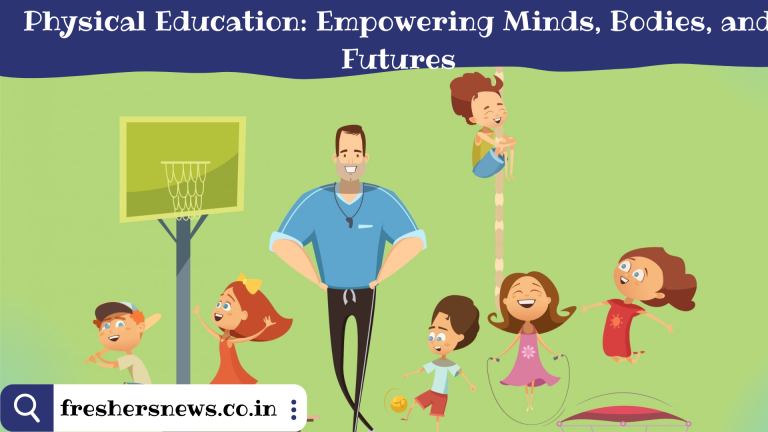Physical education (PE) encourages the fusion of physical exercise with academic objectives, which is essential for the complete development of people. Beyond the apparent gains in physical fitness, PE has some advantages for mental, interpersonal, and emotional health. In this article, the transforming potential of physical education is examined, emphasizing its effects on learning, mental health, and general human development. This article stresses the significance of realizing the potential of physical education to strengthen minds, bodies, and futures. It does so with the use of convincing facts and data.
It is impossible to exaggerate the value of physical education in a culture where sedentary lifestyles and technological advancements are the norm. Physical education is essential for developing individuals as wholes, fostering personal development, and enhancing long-term welfare. It does more than only educate about physical activity and sports. Physical education catalyzes personal growth and accomplishment by addressing all facets of students’ physical, cognitive, and emotional well-being.

Key Facts and Figures :
- Numerous studies have demonstrated that kids who regularly engage in physical education tend to do better academically and have higher levels of attention. For instance, a Centres for Disease Control and Prevention study revealed that reading, writing, and arithmetic test results were higher in schools with effective physical education programs.
- The World Health Organisation claims that inactivity, which causes 3.2 million deaths yearly, is a major risk factor for mortality worldwide.
- Obesity, diabetes, and heart disease are just a few chronic disorders that physical education helps lower the chance of acquiring.
- According to research, exercising can enhance mental health by lowering stress, anxiety, and sadness.
- Students who participate in physical education programs can learn tenacity, discipline, and respect—valuable traits beyond the gym. These character-enhancing qualities support human development and resiliency in various spheres of life.
Academic Performance:
1. Improved Cognitive Function:
- Studies have indicated that regular exercise improves cognitive abilities such as attention, memory, and information processing.
- Compared to their sedentary counterparts, students who regularly participate in physical education have greater academic performance and cognitive capacities.
2. Improved Executive Function:
- Physical education positively impacts executive function abilities, including problem-solving, decision-making, and self-regulation.
- • Students who regularly participate in physical education gain the concentration, self-control, and discipline that are essential for academic achievement.
Table 1: Academic Performance Indicators
| Indicator | Benefits of Physical Education |
| Academic achievement | Improved test scores and grades |
| Cognitive function | Enhanced attention, memory, and information processing |
| Executive function skills | Improved problem-solving, decision-making, and self-regulation |
II. Mental Well-Being:
1. Reduced Stress:
- Students who participate in physical education have better control over their anxiety and despair.
- Exercise causes the release of endorphins, which enhance relaxation and a sensation of well-being.
2. Improved Body Image and Self-Esteem:
- Positive body image, self-confidence, and acceptance of oneself and others are fostered by regular engagement in physical activity.
- Students who participate in physical education have greater self-esteem and are less prone to encounter body image issues.
Table 2-Benefits of Mental Health,
| indicator | Benefits of PE |
| Stress management | reduction of despair and anxiety |
| Self esteem and body image | increased self-assurance and a favourable body |
| Mental well-being | increased self-assurance and a favorable body |
III. Personal Development
1. societal advancement
- Students can participate in team sports as part of physical education, which encourages collaboration, communication, and teamwork.
- It encourages social abilities, empathy, and respect for others, resulting in the growth of all-around people.
2. Long-term healthful routines:
- Adopting an active lifestyle is encouraged through PE, which improves long-term health results.
- Students who get high-quality physical education are more likely to develop lifelong routine exercise routines.
Table 3: Personal Development Advantages
| indicator | Benefit |
| Social skill | Improved teamwork, cooperation, and communication |
| Personal growth | Development of well-rounded individuals |
| Lifelong healthy habits | Encourages regular physical activity throughout life |

Developing Physical Fitness:
- The primary purpose of physical education is to help students improve their physical fitness. By engaging in various activities, students appreciate the importance of leading an active lifestyle. Physical fitness includes various elements such as body composition, muscular strength, cardiovascular endurance, and flexibility.
- Cardiovascular activities that elevate heart rate and improve cardiovascular endurance include running, swimming, and cycling. These workouts help to strengthen bones, enhance bone density, and tone muscles. Flexibility exercises that concentrate on developing joint mobility and range of motion include stretching and yoga. Flexibility is vital for maintaining excellent posture, preventing accidents, and doing daily duties quickly.

Collaboration and Teamwork :
- Physical education provides an ideal atmosphere for developing student teamwork and collaboration. Participating in team sports or other group activities helps students develop collaboration, communication, and support skills. These experiences may teach you leadership, empathy, and teamwork, to name a few life skills.
- Individuals who play team sports such as basketball, volleyball, or soccer must know their teammates’ places on the team, communicate with them, and collaborate to achieve the team’s goal. Students learn the importance of teamwork, compromise, and problem-solving through cooperative activities and shared duties. These qualities extend beyond the gym and are essential for success in both the personal and professional realms.
Conclusion :
Physical education is essential in developing well-rounded individuals, improving physical health, developing motor skills, fostering teamwork, and strengthening mental fortitude. Through its various aims, physical education provides students with the skills they need to live active and fulfilling lives. In addition to physical well-being, it promotes social skills, emotional health, and cognitive capacity.
We can encourage the next generation to embrace a balanced and healthy lifestyle by underlining the significance of physical education and its positive impacts, paving the way for a brighter future. By employing a comprehensive and holistic approach to physical education, educational institutions may unleash the true potential of physical education and develop students’ minds, bodies, and futures.

